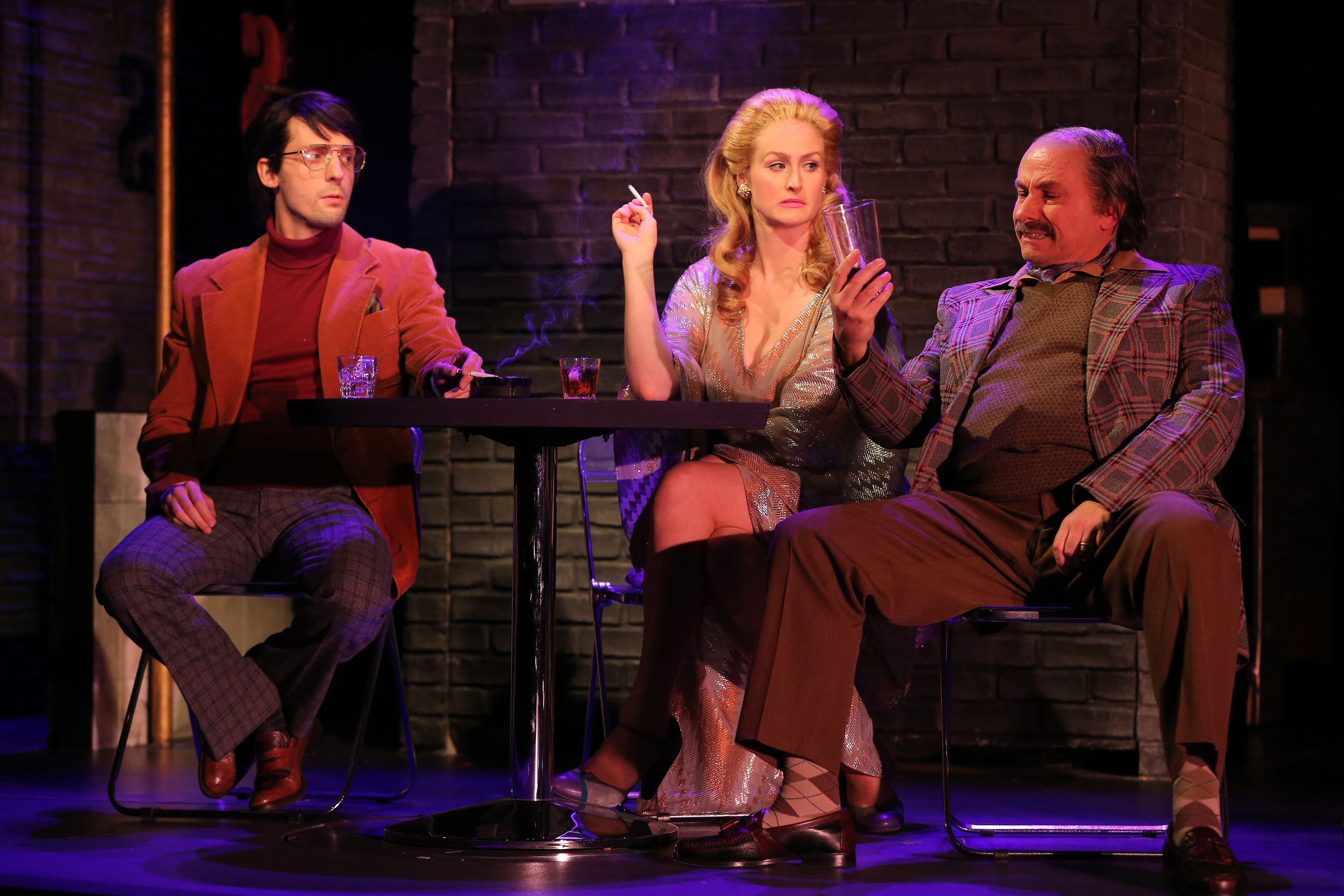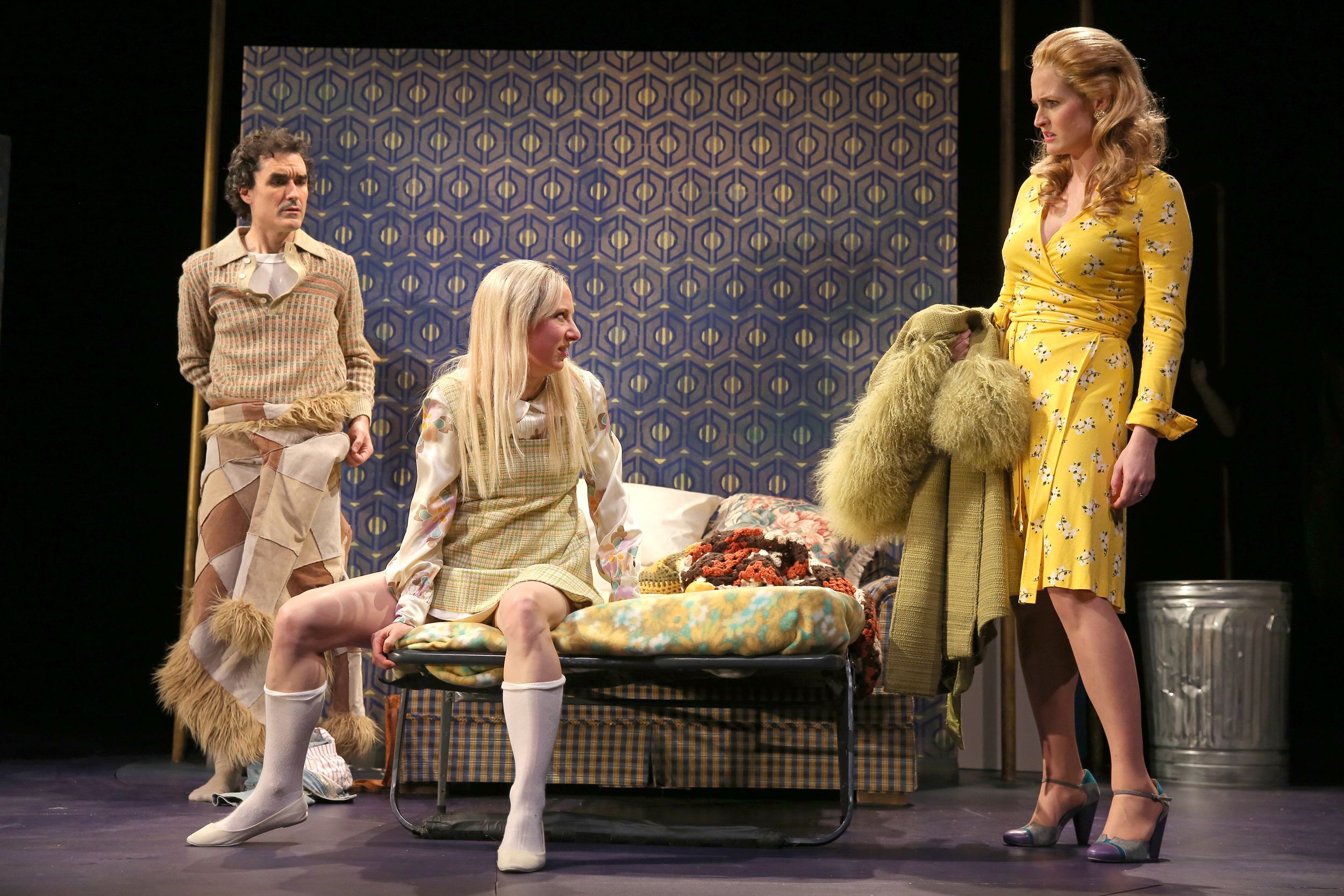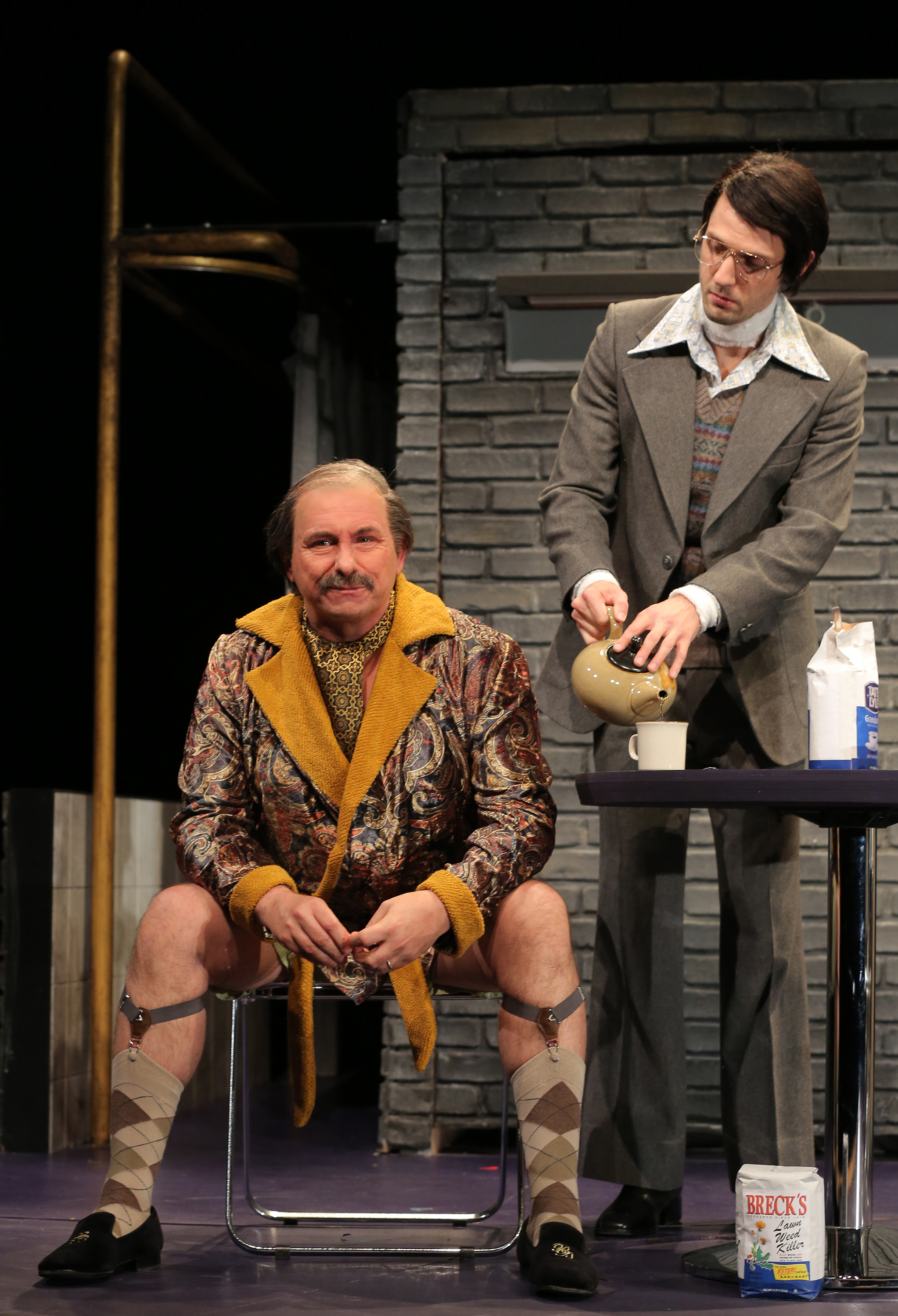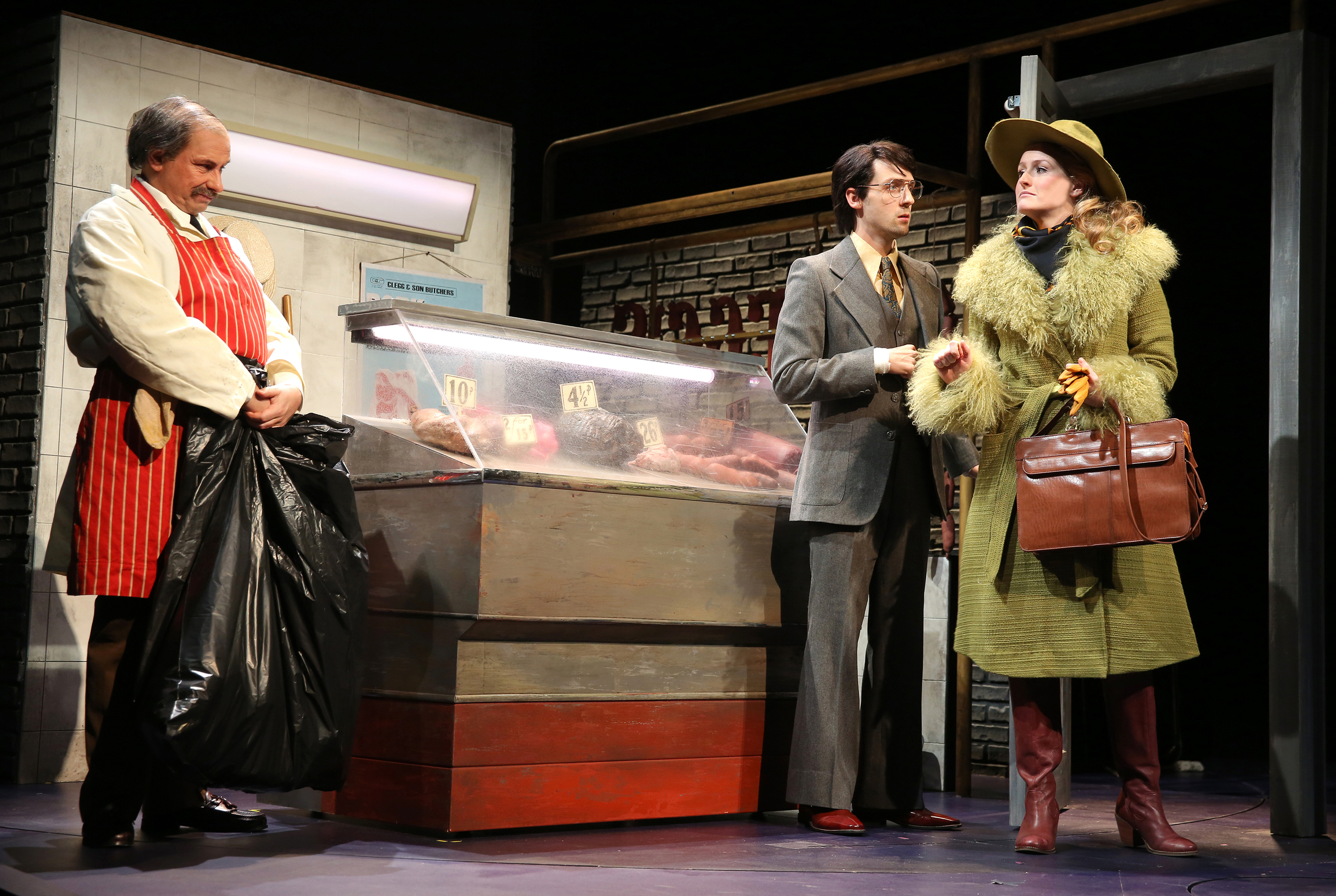Review of And a Nightingale Sang at Westport Country Playhouse
C.P. Taylor’s memory play And a Nightingale Sang, running through June 27 at Westport Country Playhouse, gives us Helen Stott (an incandescent Brenda Meaney), looking back at life in Newcastle, England, during WWII and at her family’s experience of day-to-day existence under the Blitz. From her first words, Meaney establishes a presence of such frankness, poignancy, and strength that we are willing to follow her wherever she might lead. Meaney's acting belongs in the highest ranks. For her performance alone, And a Nightingale Sang is worth seeing.
The device of Helen’s direct address adds a pleasingly modern dimension to Taylor’s well-made drama. As the narrator, one moment Helen is introducing characters, the next she is explaining the subtext, and then for a time she melts into the action. Leisurely-paced and short on surprises, Nightingale is most powerful when Helen—whose limp has kept her (in her view) a spinster—tells her own coming-of-age story, which took place in her early middle years. David Kennedy’s direction, however, falls short of conveying the terrors of war, and thus this production slants a bit too far towards the comfortable and the bittersweet.
The opening scene serves mainly to establish characters and introduce the working-class Stott family. Pretty younger daughter Joyce (Jenny Leona) is trying to decide whether to accept the marriage proposal of Eric (John Skelley), a soldier who is about to ship off to France; Joyce’s mother, Peggy (Deirdre Madigan), is desperately trying to get out of the house to visit one of the priests who, she fears, is having a war-related crisis of faith. Meanwhile Peggy’s father, Andie (Richard Kline), has just lost his beloved dog (whose dead body he has brought into the house in a cloth sack) and is trying to round up funeral goers. In the background, George (Sean Cullen), the father of the family, plays merrily on the piano and provides a humorous commentary on the cacophonous events. We immediately see that everyone in the family depends upon Helen for her good sense, kindness, and alacrity with a cup of tea. The war first intervenes at this point, in the form of sirens signaling a possible attack.
Because Helen’s memory drives the plot, the strongest storyline revolves around her love affair with Eric’s soldier friend Norman (Matthew Greer), the only man who has ever looked at her, much less declared his attraction and affection. Some of the sweetest moments occur here, as well as some of the play’s few genuine revelations. Greer is appealing, touching, and appropriately mysterious, while Helen’s emotional and sexual awakening brings to mind a more emotionally stable Laura, of The Glass Menagerie, if the Gentleman Caller had fallen for her and in doing so, changed her life.
In the Stott household, humor, whether intentional or not, often pierces the darkness of the war, and Kennedy and his cast play up this element with crisp expertise. Indeed, these remarkable actors lift the script beyond its own limitations. Every performance shines. Sean Cullen brings a boyish twinkle to George Stott and sings and plays the piano as if he were born at the keyboard. As Peggy, Deirdre Madigan captures the conventionality of a staunch Catholic of her time and then layers this with unexpected nuance. Jenny Leona brings both fragility and fire to the role of Joyce. And Richard Kline, as Andie, delivers his fatalistic pronouncements, honed on the battle fields of WWI, with dry wit, while also conveying the vulnerability of a man who has come to love his pets as much as his family: Tibby the cat reminds him that he is still needed.
As the soldier, Eric, John Skelley keeps us on his side even when his behavior is at its most churlish. Eric—one minute a fun-loving guy, the next minute a lout— is a tricky role, but Skelley, under Kennedy’s guidance, helps us to see a youth made by war to act the adult before he is ready.
The scenic design, by Kristen Robinson, and the lighting design, by Matthew Richards, are to be commended too. The set is a large brick open space that serves most often as the Stott’s home, but that also remains abstract—like memory—so that two chairs brought downstage can become a park bench or a front parlor, and the characters can move through the central open space and enter a dance hall or a hotel or a homely flat. Richards’ lighting serves to create the effect of memory: when the spotlight isolates and illuminates Helen, we know we are in her mind, and when the light broadens, we know we are back in the scenes of the past.
With such a strong design team—including sound design by Fitz Patton—one only wishes that Kennedy had chosen to make the moments when war breaks into the Stotts’ domestic concerns more jolting, terrifying, and real. Sirens should be louder, bombs should shake the theater walls, and flashing lights should blind. However, the terrific cast nearly makes up for this missing dramatic element: they bring to the stage their own brilliance, in all senses of the word.
And a Nightingale Sang
By C.P Taylor
Directed by David Kennedy
Cast: George: Sean Cullen; Norman: Matthew Greer; Andie: Richard Kline; Joyce: Jenny Leona; Peggy: Deirdre Madigan; Helen: Brenda Meaney; Eric: John Skelley
Scenic Design: Kristen Robinson; Costume Design: Michael Krass; Lighting Design: Matthew Richards; Sound Design: Fitz Patton; Dialect Consultant: Elizabeth Smith; Props Master: Karin White; Choreographers: Lisa Gajda and Mary Ann Lamb; Casting: Tara Rubin Casting; Production Stage Manager: Marcie A. Friedman; Assistant Stage Manager: Samantha Flint
Westport Country Playhouse
June 9-27, 2015











